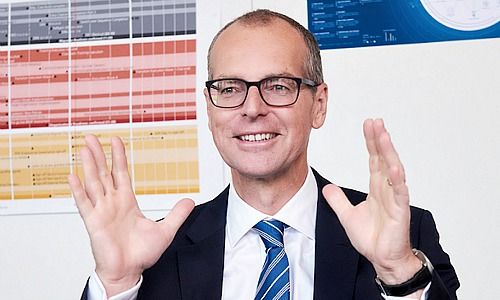Dirk Klee: «We Built Sort of iPhone»
Talented private bankers are hard to come by, so they need to be equipped with digital tools, UBS wealth management operating chief Dirk Klee tells finews.asia.
Dirk Klee, where is UBS with the rollout of its One Wealth Management Plattform, or One WMP?
We hit the biggest milestone this October, when we transferred more than 300 billion Swiss francs from our Asian business onto the platform. More than 80 percent of our global assets – not counting the U.S., that is 800 billion francs – are now booked on the platform. No other bank can do this.
What is the hope for the platform?
We've built a sort of iPhone. What I mean is that any technology we develop can be loaded onto the platform like an app. As as example: in Germany we rolled out e-banking services, which were developed in Switzerland, through the global platform at a fraction of the development costs. These are the true advantages of our platform.
Are there any efforts to open the platform to third parties?
This option is certainly interesting for us, and we're sounding this out with several interested parties.
How much does UBS hope to save with it?
It's a two-digit figure from the running costs of the platform. That means that after the next step, our incremental costs could fall by as much as 20 percent. Our investment recommendations and our product range will be managed centrally, as will the global distribution of products to client portfolios. The synergy potential is enormous.
So you agree UBS CEO Sergio Ermotti's predictions that UBS will employ 30 percent less staff within ten years?
I don't have a conclusive opinion on that. It's comparable to when automobiles superseded horse-drawn carriages. Yes, many coachmen lost their jobs, but found another one as a taxi driver. I think that as a bank we have to digitize our firm, just like any other industry does too. That will have a knock-on effect for employment, but I also believe these workers will be in demand for other jobs too.
That doesn't really sustainably lower costs, unless UBS is able to scale up volume.
Our primary focus is on generating growth, and digitization plays a key role here. In fact the biggest hurdle to us growing is personnel. Private bankers who can provide the level of quality service don't grow on trees. If you don't raise the level of productivity per advisors with digital helpers, analytical tools and more efficient processes, you have a growth problem.
UBS has catered to British retail clients for about a year now with a robo advisor, «Smartwealth» - a departure for a bank which primarily focuses on wealthy clientele.
It's a pilot project. Robo advisors were just beginning to emerge when I joined UBS four years ago. Instead of automatically viewing this technology as irrelevant for an advisor-driven private bank, we examined it. The technology will definitely establish itself – the question is just in what form.
- Page 1 of 2
- Next >>



























